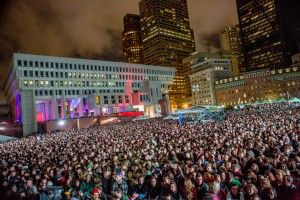Boston has lived in the shadow of New York City’s music scene for years, but the work of one Empire State native is changing all that.
Brian Appel, who co-founded the immensely popular Boston Calling festival alongside Mike Snow in Spring 2014, has met fast growth and praise with grace. With its fourth event in two years hitting the city this coming weekend, Boston Calling is upon us — a semi-annual community staple unlikely to fade away anytime soon.
Hip-hop heroes (Nas, Childish Gambino), bubbling pop stars (Lorde) and indie alt-folk groups (Volcano Choir) come together for a special three days this year. The eclectic billing reflects the understanding Appel and his team have of genres’ falling walls in 2014, and it resonates with hoards of young listeners and consumers.

“I think you’re going to see an enormous BU presence. We’re looking at having more than 1,000 BU students there just on Saturday alone,” Appel said in a phone interview with The Daily Free Press.
Appel has fond memories of long road trips to attend mesmerizing festivals with friends.
“When I was a kid growing up, we would go see Phish. They would do their own festivals,” he said. “That was really amazing when you’re 16 or 17 years old. You just got your driver’s license, and you’re going 1,000 miles to a place uninhabited by anyone else except likeminded fans. Those early days formed a great love for creative, outdoor music events.”
The show-goer traveled north in a move to Boston about 12 years ago. The subsequent decade took him from the offices of the Boston Phoenix and WFRX Radio to calling shots and heading what might be the most exciting music event to bless Boston exclusively since the inception of the Pops’ Symphony Hall more than a century ago.
His media work and emergency responder experience lent a base knowledge of permits, cooperating with City Hall and public safety, but nothing could compare to running a festival.
“Anything [Mike and I] had done prior to Boston Calling was nowhere near the size and scope of what this event became,” he said.
Interestingly, the initial festival idea actually came to Appel and Snow while still working for radio.
“I was working as a paramedic in Cambridge for a couple years before finding my way over to the Phoenix and FRX — I did marketing there for seven years,” he recalled. “Out of my time there with my partner Mike Snow, we created the idea for a music festival for the radio station. When the station ultimately stopped broadcasting, we decided to take on the project ourselves.”
What could have become Boston’s take on Hot 97’s Summer Jam concert near New York City instead brewed an independent movement.
Appel said without a hint of humor that no show promoter ever calls his or her trade “smooth sailing,” but he and Snow weathered the rough waters of the festival’s first year thanks to the guiding help of Aaron Dessner, member of rock band The National and a crucial cosign with an ear for curating to boot. Dessner signed on to join Boston Calling’s management team, fulfilling an artists-and-repertoire role that leaves him largely responsible for handpicking artists to perform.
“There are lots of festivals out there in the world you’ve never heard of before because they never get off the ground,” Appel said. “It’s such a tough time to book bands in the first year. When The National became a partner of ours and agreed to play the inaugural event, that made our lives on the booking side a whole lot easier. Agents would see The National was going to be there, which gave it some credibility.”
Appel and his counterparts worked to gain their host city’s respect, too, boosting Boston Calling’s credibility among officials by complying with any and all safety requirements, which he stresses as the key to operating in Boston.
“The city is not difficult…to work with,” he said. “They’re fair, but you have to have a plan that is safe bar-none, and once you have that, everything can come together.”
The intensive preparations for the festival and its following success led to several meetings with former Boston Mayor Thomas Menino and current Mayor Martin Walsh, the latter of whom Appel said has been “very supportive, to the point where he has taken the support that Menino gave [them] and took it a step forward.”
Chief among the restrictions loosened by Walsh is the newly admitted sale of beer in certain zones. The change yielded no incidences during Boston Calling’s spring showcase in May, a feat that registers as one of Appel’s proudest moments as an event organizer.
Appel recounted a story from the May 2014 showcase regarding the most common criticism of Boston Calling he faced: Jack Johnson, the headliner, brought free water for fans during his set. When he left, the water coolers went with him, leaving the Saturday and Sunday crowds without any refreshing amenity. Upon hearing consumers’ concerns, Appel made sure to eliminate the problem for all future festivals by supplying “free water for everybody for all three days.”
The issue itself is admittedly minor compared to those hurled at Coachella, Lollapalooza and other major festivals, but Appel gets it: Small gestures go a long way.
For all the holograms and reunion acts making headlines at internationally recognized festivals in recent years, Appel and Snow’s event finds its calling through simplicity. In-and-out passes allow attendants to leave the concert grounds as they please and contribute to the local economy as they explore. Non-conflicting schedules prevent acts from competing against each other for an audience.
And the foundational pillar beneath the gathering of musicians and their fans is one of universal acceptance: Design an enjoyable experience. Whether walking to Boston Calling from a BU dorm or driving up the East Coast, one should expect to encounter a varied sampling of top-tier music and make plenty of memories.






























































































































